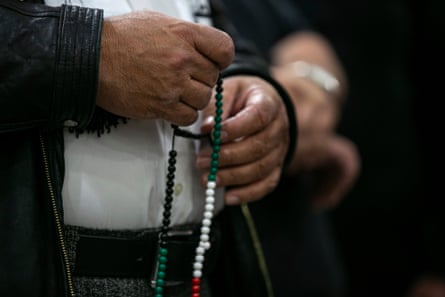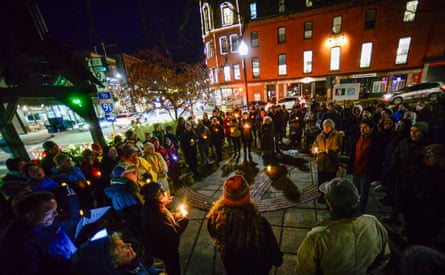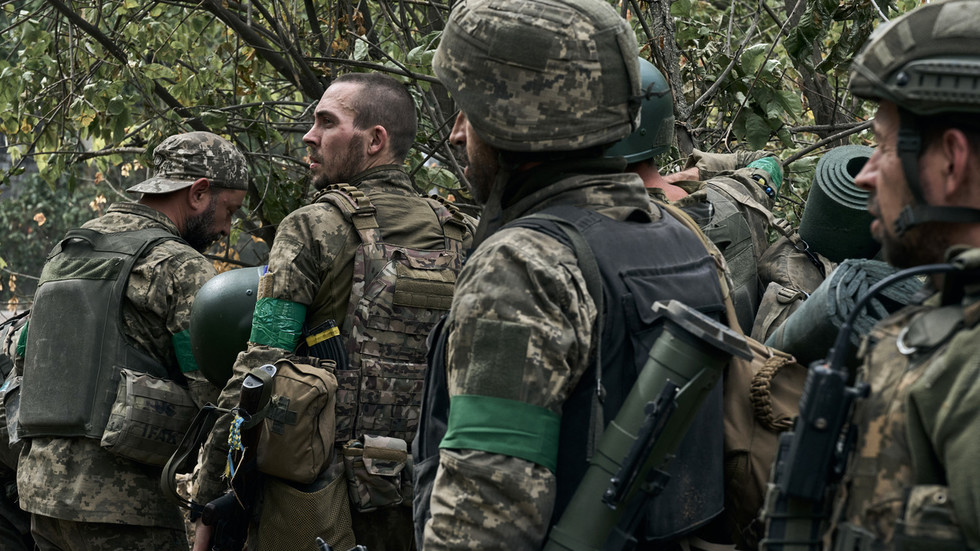Arafat Issa hangs Palestinian flags across a pedestrian bridge in Durham, North Carolina, almost every week. But on 28 July, a man in a baseball cap pulled out a knife and cut the flags down from the steel railing. Issa says the man cursed at him and his family before waving the knife in their direction. They had two small children, including Issa’s four-month-old daughter, with them.
“He told us: go back where you came from,” Issa says. “I was scared … it’s not like we were doing anything wrong. We were peacefully protesting.”
Issa is a 42-year-old Palestinian American barber who has lived in North Carolina for more than a decade. His parents and siblings are in the West Bank, where settler violence against Palestinians is escalating. His experience is one of many examples of anti-Palestinian and anti-Muslim hate documented by the Council on American-Islamic Relations (Cair) since 7 October of last year. “We are seeing an uptick in violent vigilante response to peaceful pro-Palestinian protesters,” said Nicole Fauster-Bradford, a community advocacy director at Cair.
Advocates say the aftermath of 7 October in the US had echoes of the fear that followed 9/11, when the government expanded surveillance powers that were largely wielded against Muslim and Arab communities, and hate crimes against them surged.

“Islamophobia comes in cycles – often tied to something in the news,” says Corey Saylor, research and advocacy director at Cair. The last year, he continued, “ stands out for its enormity”.
On the other hand, the last year has also seen a movement for Palestinian rights that is unprecedented in its size and visibility. “This is not the community that was subjected to payback after 9/11. It’s much stronger now,” says Saylor. “Early on, there was fear. I would say that’s completely morphed to resilience”
From January to June of this year, Cair vetted almost 5,000 complaints of alleged Islamophobia; that’s an increase of more than two-thirds compared to the same period the previous year. The volume of incidents was particularly bad in the immediate aftermath of 7 October. In the last three months of 2023, Cair received more than 3,500 complaints, an almost 180% increase in relation to the corresponding months in 2022.
Cair defines Islamophobia as a fear, hatred or prejudice towards Islam or Muslims perpetuated by people and institutions. Many of the incidents in the last year entailed anti-Palestinian censorship and discrimination – Cair says it counts these cases because anti-Muslim and anti-Palestinian bias are often conflated. Experts note that anti-Muslim sentiment has actually its origins in anti-Palestinian discrimination – Arab Americans organizing for Palestine in the 1960s and 70s were spied on by the government and some of the country’s first anti-terrorism laws evolved as a response to Palestinian liberation struggles.
Among the most violent incidents of the last year were the fatal Chicago stabbing of six-year-old Wadea al-Fayoume and a Vermont shooting of three Palestinian college students that left one of them, 21-year-old Hisham Awartani, paralyzed. But far more common is what advocates view as the censorship and discipline of students and employees for being pro-Palestinian.

“Post 9/11 was more of the knee-jerk reaction: your typical bigot inside a grocery store targeting a Muslim hijabi. That’s reactionary, that’s the type of discrimination we were used to,” says Abed Ayoub, national executive director of the Arab American Anti-Discrimination Committee. The targeting of students and employees since October 7 feels systematic, he adds.
Of the almost 5,000 complaints Cair received in the first half of this year, it said 19% were related to immigration and asylum, 14% to employment discrimination, 10% to education discrimination and 8% were hate crimes and similar incidents. Cair says immigration cases – often involving people from Muslim-majority countries facing extra scrutiny – have long been the most common kinds of complaints they get.
What’s new is people being targeted at their schools and workplace “in a personal way that we’ve never seen before”, says Saylor. This can involve, for example, students and employees who get disciplined for social media posts supporting Palestine. Cair views these cases as discriminatory because, the group says, the rules are often enforced inconsistently, with workplaces and schools that send emails supportive of Israel punishing employees with different political opinions.
Palestine Legal, a non profit that has filed more than a dozen complaints with the education department alleging anti-Palestinian discrimination, says the rules often go out the window when it comes to pro-Palestinian speech. “[Students are] being dragged through disciplinary hearings without any due process. They’re getting suspended before any conclusion has been made in their disciplinary hearing,” says Dima Khalidi, the organization’s founder and director.
Like Cair, Palestine Legal was flooded with cases in the three months following 7 October, when it received more than 1,000 requests in that time. (That’s four times higher than the number of requests they received in all of 2022.) Both organizations note their tallies are likely undercounts.
Alongside these incidents, antisemitism has also been rising. FBI data released in September noted that anti-Jewish hate crimes increased by almost two-thirds in 2023, from 1,122 documented incidents to 1,832. It’s not immediately clear how many of those occurred after Oct. 7. The Anti-Defamation League has also recorded a surge in antisemitic incidents, but its data has been called into question for its conflation of antisemitism with criticism of Israel.
Advocates point to what they say is the normalization of rhetoric conflating Arab Americans with terrorism, a pattern that recalls the post-9/11 environment. Last month, Republican senator John Kennedy repeatedly suggested, without evidence, that Maya Berry, the head of the Arab American Institute, supported Hamas and said that she should hide her “head in a bag”. That same month, the National Review ran a cartoon depicting congresswoman Rashida Tlaib with a detonating pager – days after such devices blew up across Lebanon in an operation targeting Hezbollah that has been widely attributed to Israel.

In the aftermath of 9/11, a slew of legislation justified law enforcement measures against Americans under the guise of fighting terrorism. While the post-October 7 environment has not reached anywhere near that fever pitch, civil rights groups in the last year have found themselves pushing back against a number of efforts that they say conflate legitimate anti-war activity with terrorism. A coalition of more than 120 groups, including the ACLU, Amnesty International USA and Cair, recently issued an open letter warning against a measure that would that would strip non profit status from groups considered to be supporting terrorism, which is widely seen as targeting pro-Palestinian student groups.
Ramzi Kassem, the co-director and founder of Clear, a legal nonprofit and clinic at the City University of New York, says his organization has seen an increase of complaints in the last year from people who have been approached by the FBI and other agencies in relation to protest activities – through door knocks, at airports and borders, and when applying for immigration benefits. They are not only Palestinians, Arabs, or Muslims, but also people of other backgrounds who support Palestinian rights and oppose current US and Israeli policies.
History shows that progressive movements challenging the status quo are often met with surveillance and disruption by US law enforcement, he says: “We saw that with the civil rights movement, the Vietnam war, the anti-apartheid movement, and Black Lives Matter. We’re seeing that again now.”
But any hostility – whether from neighbors, school administrators, or decision-makers – does not seem to be dampening what has become a mass movement for Palestinian liberation. Weeks after Issa’s flags were cut down, on 22 August, he returned to the American Tobacco Trail Bridge with a friend. Another stranger approached them and told them to take the signs down – this time, carrying a gun, Issa says. The two friends tried to follow the man to note down his license plate but retreated after he threatened to shoot them.
Issa called the police about both incidents but law enforcement has so far declined to pursue prosecution. In the meantime, Issa can’t imagine not protesting. He plans to go back to the bridge. “We have to support our family. It’s not safe but it’s not more dangerous than what they are living through,” he says. “We have to keep going. It’s our duty.”

 By The Guardian (World News) | Created at 2024-10-03 11:20:13 | Updated at 2024-10-05 05:28:21
1 day ago
By The Guardian (World News) | Created at 2024-10-03 11:20:13 | Updated at 2024-10-05 05:28:21
1 day ago



